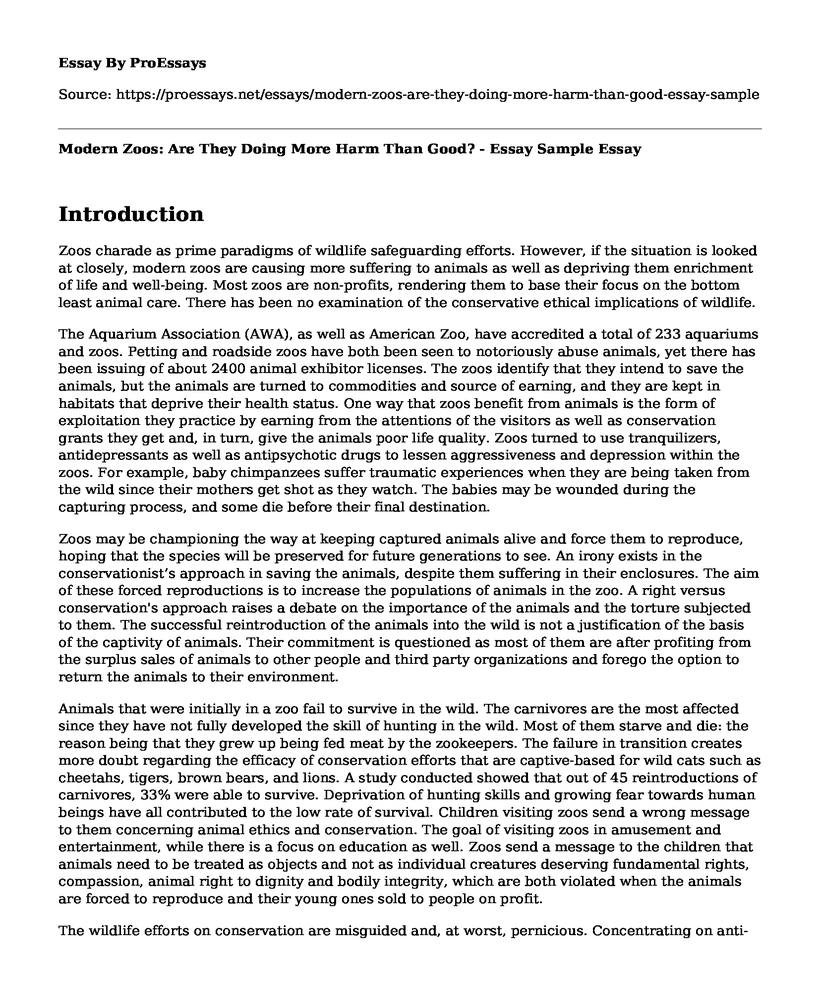Introduction
Zoos charade as prime paradigms of wildlife safeguarding efforts. However, if the situation is looked at closely, modern zoos are causing more suffering to animals as well as depriving them enrichment of life and well-being. Most zoos are non-profits, rendering them to base their focus on the bottom least animal care. There has been no examination of the conservative ethical implications of wildlife.
The Aquarium Association (AWA), as well as American Zoo, have accredited a total of 233 aquariums and zoos. Petting and roadside zoos have both been seen to notoriously abuse animals, yet there has been issuing of about 2400 animal exhibitor licenses. The zoos identify that they intend to save the animals, but the animals are turned to commodities and source of earning, and they are kept in habitats that deprive their health status. One way that zoos benefit from animals is the form of exploitation they practice by earning from the attentions of the visitors as well as conservation grants they get and, in turn, give the animals poor life quality. Zoos turned to use tranquilizers, antidepressants as well as antipsychotic drugs to lessen aggressiveness and depression within the zoos. For example, baby chimpanzees suffer traumatic experiences when they are being taken from the wild since their mothers get shot as they watch. The babies may be wounded during the capturing process, and some die before their final destination.
Zoos may be championing the way at keeping captured animals alive and force them to reproduce, hoping that the species will be preserved for future generations to see. An irony exists in the conservationist’s approach in saving the animals, despite them suffering in their enclosures. The aim of these forced reproductions is to increase the populations of animals in the zoo. A right versus conservation's approach raises a debate on the importance of the animals and the torture subjected to them. The successful reintroduction of the animals into the wild is not a justification of the basis of the captivity of animals. Their commitment is questioned as most of them are after profiting from the surplus sales of animals to other people and third party organizations and forego the option to return the animals to their environment.
Animals that were initially in a zoo fail to survive in the wild. The carnivores are the most affected since they have not fully developed the skill of hunting in the wild. Most of them starve and die: the reason being that they grew up being fed meat by the zookeepers. The failure in transition creates more doubt regarding the efficacy of conservation efforts that are captive-based for wild cats such as cheetahs, tigers, brown bears, and lions. A study conducted showed that out of 45 reintroductions of carnivores, 33% were able to survive. Deprivation of hunting skills and growing fear towards human beings have all contributed to the low rate of survival. Children visiting zoos send a wrong message to them concerning animal ethics and conservation. The goal of visiting zoos in amusement and entertainment, while there is a focus on education as well. Zoos send a message to the children that animals need to be treated as objects and not as individual creatures deserving fundamental rights, compassion, animal right to dignity and bodily integrity, which are both violated when the animals are forced to reproduce and their young ones sold to people on profit.
The wildlife efforts on conservation are misguided and, at worst, pernicious. Concentrating on anti-poaching measures reduces the degree of extinction faced by zoo animals. Some animals may be having good health but are mentally exhausted if there are natural needs that the animals fail to meet.
Cite this page
Modern Zoos: Are They Doing More Harm Than Good? - Essay Sample. (2023, Aug 14). Retrieved from https://proessays.net/essays/modern-zoos-are-they-doing-more-harm-than-good-essay-sample
If you are the original author of this essay and no longer wish to have it published on the ProEssays website, please click below to request its removal:
- Essay Sample on Internet Addiction as a Medical Condition
- Economic Empowerment of Women in the 19th Century - Essay Sample
- Child Labour in the 21st Century - Essay Sample
- Breaking Down Barriers: Overcoming Segregation & Discrimination - Essay Sample
- Essay Example on Promoting Healthy Weights: Parent & School Interventions
- The Economics of Income Inequality: Exploring Different Sources of Income - Essay Sample
- Drug Abuse: Its Impacts on Male Reproductive System - Essay Sample







